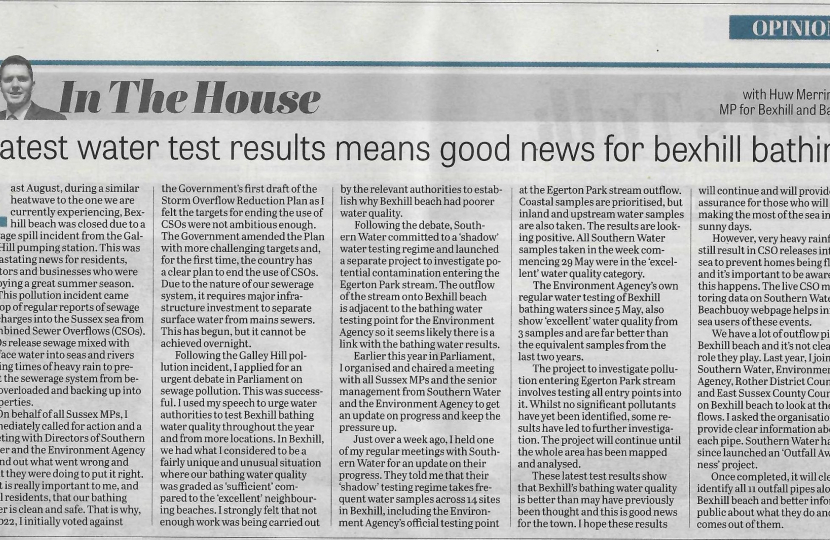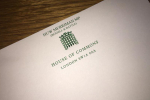
Last August, during a similar heatwave to the one we are currently experiencing, Bexhill beach was closed due to a sewage spill incident from the Galley Hill pumping station. This was devastating news for residents, visitors and businesses who were enjoying a great summer season.
This pollution incident came on top of regular reports of sewage discharges into the Sussex sea from Combined Sewer Overflows (CSOs). CSOs release sewage mixed with surface water into seas and rivers during times of heavy rain to prevent the sewerage system from being overloaded and backing up into properties.
On behalf of all Sussex MPs, I immediately called for action and a meeting with Directors of Southern Water and the Environment Agency to find out what went wrong and what they were doing to put it right.
It is really important to me, and local residents, that our bathing water is clean and safe. That is why, in 2022, I initially voted against the Government’s first draft of the Storm Overflow Reduction Plan as I felt the targets for ending the use of CSOs were not ambitious enough. The Government amended the Plan with more challenging targets and, for the first time, the country has a clear plan to end the use of CSOs. Due to the nature of our sewerage system, it requires major infrastructure investment to separate surface water from mains sewers. This has begun, but it cannot be achieved overnight.
Following the Galley Hill pollution incident, I applied for an urgent debate in Parliament on sewage pollution. This was successful. I used my speech to urge water authorities to test Bexhill bathing water quality throughout the year and from more locations. In Bexhill, we had what I considered to be a fairly unique and unusual situation where our bathing water quality was graded as ‘sufficient’ compared to the ‘excellent’ neighbouring beaches. I strongly felt that not enough work was being carried out by the relevant authorities to establish why Bexhill beach had poorer water quality.
Following the debate, Southern Water committed to a ‘shadow’ water testing regime and launched a separate project to investigate potential contamination entering the Egerton Park stream. The outflow of the stream onto Bexhill beach is adjacent to the bathing water testing point for the Environment Agency so it seems likely there is a link with the bathing water results.
Earlier this year in Parliament, I organised and chaired a meeting with all Sussex MPs and the senior management from Southern Water and the Environment Agency to get an update on progress and keep the pressure up.
Just over a week ago, I held one of my regular meetings with Southern Water for an update on their progress. They told me that their ‘shadow’ testing regime takes frequent water samples across 14 sites in Bexhill, including the Environment Agency’s official testing point at the Egerton Park stream outflow. Coastal samples are prioritised, but inland and upstream water samples are also taken. The results are looking positive. All Southern Water samples taken in the week commencing 29 May were in the ‘excellent’ water quality category.
The Environment Agency’s own regular water testing of Bexhill bathing waters since 5 May, also show ‘excellent’ water quality from 3 samples and are far better than the equivalent samples from the last two years.
The project to investigate pollution entering Egerton Park stream involves testing all entry points into it. Whilst no significant pollutants have yet been identified, some results have led to further investigation. The project will continue until the whole area has been mapped and analysed.
These latest test results show that Bexhill’s bathing water quality is better than may have previously been thought and this is good news for the town. I hope these results will continue and will provide reassurance for those who will be making the most of the sea in these sunny days.
However, very heavy rainfall can still result in CSO releases into the sea to prevent homes being flooded and it’s important to be aware when this happens. The live CSO monitoring data on Southern Water’s Beachbuoy webpage helps inform sea users of these events.
We have a lot of outflow pipes on Bexhill beach and it’s not clear what role they play. Last year, I joined Southern Water, Environment Agency, Rother District Council and East Sussex County Council on Bexhill beach to look at the outflows. I asked the organisations to provide clear information about each pipe. Southern Water has since launched an ‘Outfall Awareness’ project. Once completed, it will clearly identify all 11 outfall pipes along Bexhill beach and better inform the public about what they do and what comes out of them.




